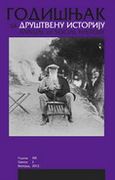Калуп за историјско памћење: Балкански ратови у српским уџбеницима историје (1920-2013)
Mould for war remembrance: Balkan wars in Serbian History Textbooks (1920-2013)
Author(s): Dubravka StojanovićSubject(s): History
Published by: Udruženje za društvenu istoriju
Summary/Abstract: Balkan wars were considered to be the climax of Serbian war history, its most successful event. They were treated as the fulfillment of the medieval oath given to the Prince Lazar after his death in the Kosovo battle 1389 since Kosovo was regained for Serbia after 1912. For all those military, political, historical and mythical reasons Balkan wars had a very important place in Serbian politics of memory. They were treated both as a proof of invincibility of the Serbian army and as the cradle of national pride. They were considered to be the start of the “liberation and unification” of Serbian people. Later they were perceived as the beginning of the creation of Yugoslavia, which put them in the center of the Yugoslav myth. During the 1990ies they became the new source of national pride and inspiration of Miloševic’s war policy, especially in Kosovo. In history textbooks they always had their special place. The aim of this paper will be to compare narratives on Balkan wars from the first history textbooks in which they were interpreted (1930ies) to the latest ones. The main thesis is that the mythical matrix had never changed despite different political systems and states in which Serbia had spent the 20thcentury and that the interpretation of Balkan wars became a mould for all war remembrance including the First World War, the Second World War and the war of the 1990ies.
Journal: Godišnjak za društvenu istoriju
- Issue Year: XIX/2012
- Issue No: 3
- Page Range: 91-103
- Page Count: 13
- Language: Serbian

